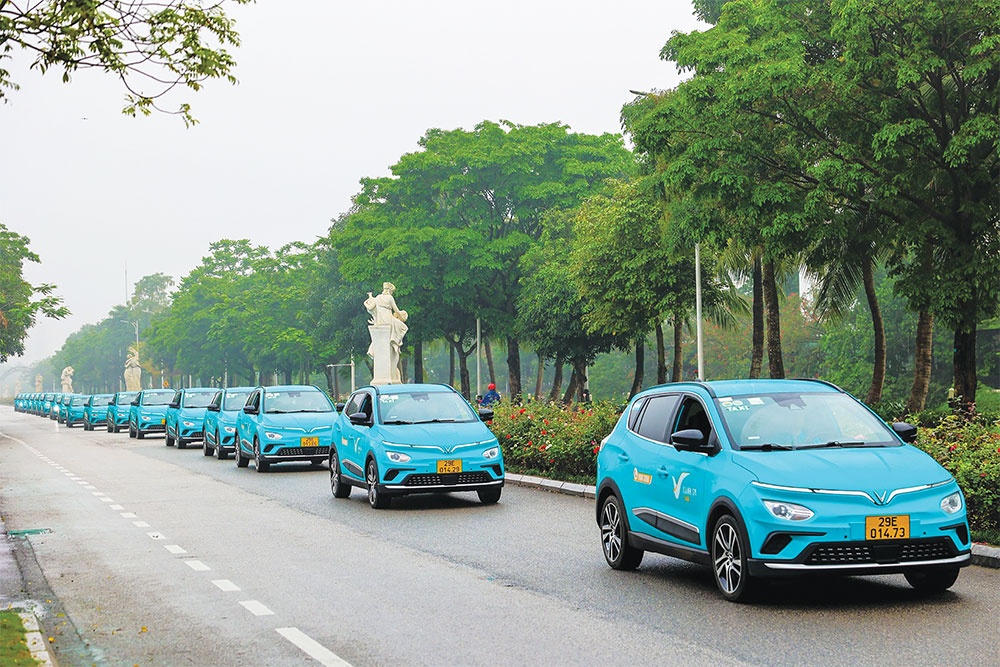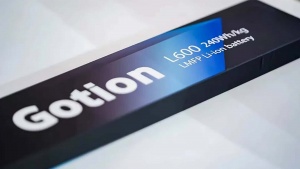GSM expands e-taxi service with motorbike deployment
 |
| GSM’s four-wheeled taxis have been a prominent sight in places like Hanoi over the past few months |
Last week, Green and Smart Mobility JSC (GSM), a company founded by the owner of VinFast, began operating GSM Bike in Hanoi after four months of deploying electric taxis.
Nguyen Van Thanh, general director of GSM, said the launch event of GSM Bike was of great significance. “After only four months of operation, we became the world’s first all-electric carrier. In parallel with the plan to expand the electric taxi service across 27 cities and provinces, and three countries, GSM plans to cover EV services in five cities and provinces with a number of vehicles up to 60,000 units this year,” Thanh said.
The move comes after Indonesia-based Gojek teamed up with Vietnamese e-scooter startup Dat Bike, and Grab Vietnam announced the trial of a delivery service through startup Selex Motors. Baemin is also experimenting with both of these startups.
Sumit Rathor, general manager of Gojek Vietnam, said, “Vietnam is an important market for Gojek, and the group’s aim is to continue to provide users with impactful solutions that support the sustainable growth of our partners.”
Gojek’s partnership with Dat Bike, Rathor added, is an important step to support the group’s efforts in helping it cut its emissions and transition its fleet to 100 per cent EVs.
Both Gojek and Grab, which were founded in 2010 and 2012, seek to be the super app of choice in Southeast Asia’s largest economy. Grab set foot in the Vietnamese market in 2014 with the initial service of connecting with taxi companies. The platform launched the GrabBike service that same year.
The scale of this field in Vietnam is currently estimated at $3 billion in 2022 and up to $5 billion in 2025, with a 21 per cent growth rate.
Besides the two traditional ride-hailing services, Grab has expanded to many other services such as food and shopping delivery, among others. The application owns more than 200,000 driver partners, operating across 45 major cities and provinces in the country.
Gojek, before unifying its brand identity with the parent company in 2020, joined the Vietnamese tech car race in 2018, just a few months after Uber left Vietnam, and was acquired by Grab for operations in Southeast Asia.
According to Thanh, the advantage of GSM is to develop an EV service ecosystem from the ground up, instead of moving from petrol to electric.
“Having more EVs helps GSM become the first platform in the world that is fully electric with services ranging from motorbike, delivery, rentals, and taxis. Other technology vehicle applications are just businesses that develop applications, instead of being directly related to the EV ecosystem like GSM,” said Thanh.
VinFast has launched e-bike models in the Vietnamese market such as the Vento, Theon, Klara, Feliz, and Evo.
The company has also built charging stations throughout Vietnam. By the end of 2022, VinFast’s number of charging stations for cars and motorbikes was over 3,000, with more than 150,000 charging ports. Of these, nearly 500 are in 26 northern cities and provinces, nearly 320 across 19 central cities and provinces, and over 250 in the south.
 | Chinese battery firm Gotion invests $150 million in VinFast Chinese battery manufacturer Gotion Inc. has agreed to acquire 15 million ordinary shares of VinFast through a private issuance valuing the shares at $10 apiece, with an investment totalling $150 million, representing 0.7 per cent of VinFast's total equity. |
 | VinFast makes its move to disrupt e-vehicle industry With VinFast’s debut on the Nasdaq catapulting the Vietnamese e-vehicle company onto the global stage, experts noted that a well-defined strategic approach ahead could help it maintain some momentum. |
What the stars mean:
★ Poor ★ ★ Promising ★★★ Good ★★★★ Very good ★★★★★ Exceptional
Related Contents
Latest News
More News
- Vietnam sets ambitious dairy growth targets (February 24, 2026 | 18:00)
- Masan Consumer names new deputy CEO to drive foods and beverages growth (February 23, 2026 | 20:52)
- Myriad risks ahead, but ones Vietnam can confront (February 20, 2026 | 15:02)
- Vietnam making the leap into AI and semiconductors (February 20, 2026 | 09:37)
- Funding must be activated for semiconductor success (February 20, 2026 | 09:20)
- Resilience as new benchmark for smarter infrastructure (February 19, 2026 | 20:35)
- A golden time to shine within ASEAN (February 19, 2026 | 20:22)
- Vietnam’s pivotal year for advancing sustainability (February 19, 2026 | 08:44)
- Strengthening the core role of industry and trade (February 19, 2026 | 08:35)
- Future orientations for healthcare improvements (February 19, 2026 | 08:29)

 Tag:
Tag:




















 Mobile Version
Mobile Version